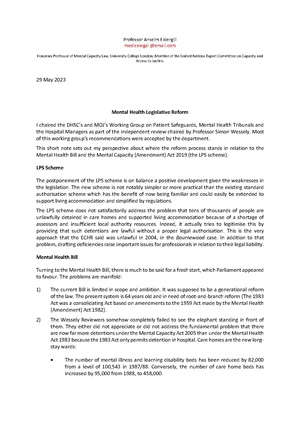Information for "Anselm Eldergill, 'Mental Health Legislative Reform' (29/5/23)"
Basic information
| Display title | Anselm Eldergill, 'Mental Health Legislative Reform' (29/5/23) |
| Default sort key | Anselm Eldergill, 'Mental Health Legislative Reform' (29/5/23) |
| Page length (in bytes) | 2,792 |
| Page ID | 15068 |
| Page content language | en - English |
| Page content model | wikitext |
| Indexing by robots | Allowed |
| Number of redirects to this page | 0 |
| Counted as a content page | Yes |
| Page image |  |
Page protection
| Edit | Allow only users with "editing" permission (infinite) |
| Move | Allow only users with "editing" permission (infinite) |
Edit history
| Page creator | Jonathan (talk | contribs) |
| Date of page creation | 09:07, 22 June 2023 |
| Latest editor | Jonathan (talk | contribs) |
| Date of latest edit | 10:26, 22 June 2023 |
| Total number of edits | 2 |
| Total number of distinct authors | 1 |
| Recent number of edits (within past 90 days) | 0 |
| Recent number of distinct authors | 0 |
Page properties
| Transcluded templates (8) | Templates used on this page:
|
SEO properties
Description | Content |
Article description: (description)This attribute controls the content of the description and og:description elements. | (1) This document criticises the proposed LPS scheme, including that it is "not notably simpler or more practical" than the existing scheme, it "tries to legitimise [tens of thousands of unlawful detentions] by providing that such detentions are lawful without a proper legal authorisation", and contains drafting deficiencies. (2) It also criticises the Mental Health Bill, with 16 numbered points, including that: the Bill is too limited and does not provide the needed root-and-branch reform; "[t]he Wessely Reviewers somehow completely failed to see the elephant standing in front of them", this being that there are now far more detentions under the MCA than MHA; the Bill does not properly address the review's main aims, and fails to deal with or deals ineffectively with tribunal discretionary discharges, seclusion, restraint, hospital managers, spouses and partners, the complicated AWOL provisions, treatment in prison, short-term powers, guardianship, and MHA-MCA interface or fusion; it does not reintroduce an MHA Commission (the CQC "now has no legally qualified members and is totally unqualified to monitor and enforce legal standards"); and does not address the shortcomings in the Court of Protection or lessons learnt from MCA implementation. (3) The conclusion is: "The problems with the legislation and the Bill are, in my view, mainly due to over-reliance on academic input and insufficient experienced practitioner input. The same problem beset the long-drawn-out Mental Health Bill process between 1998 and 2007. That began with a similarly abortive report by Professor Genevra Richardson and her committee of academics and policy officers. Legislation should have a practical focus, which can be difficult for academics and policy advisors who have not spent much time practising in psychiatric hospitals. What is now needed is a small Commission of experienced MHA practitioners to review the work that has been done and to draft themselves a completely new Bill. Extensive consultation has already taken place which will save a great deal of time. Since LPS has been postponed to the next Parliament, it may make sense to put a new Mental Health Act back until then. The revised Bill/Mental Health Act can either replace LPS with more workable arrangements and a fused scheme or make the necessary amendments to LPS within a Mental Health Bill." |